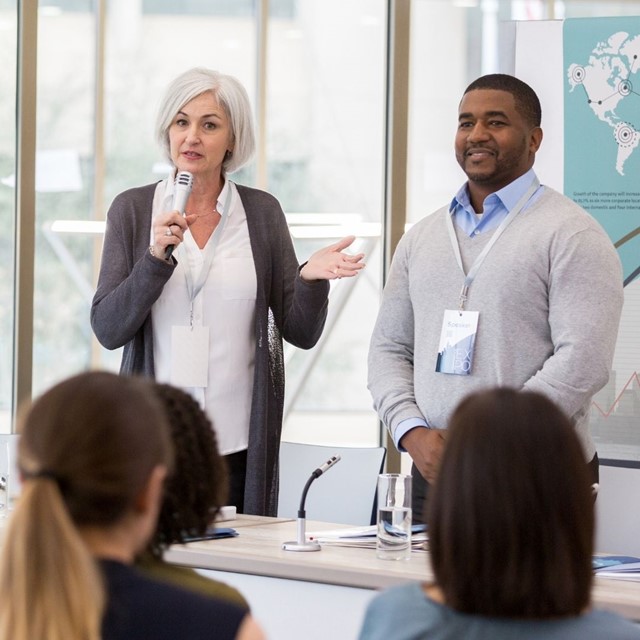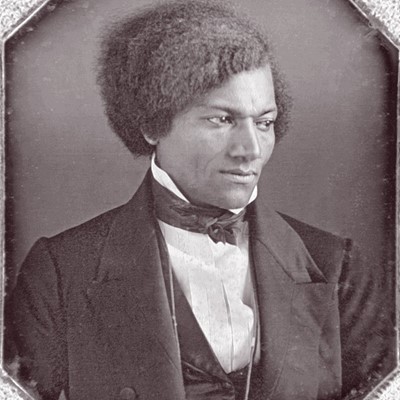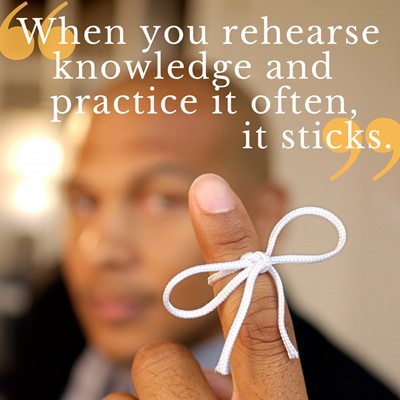
Many people we work with are tasked to do something fairly routine—getting a meeting or event started.
Typically, they need to:
- Introduce themselves
- Thank hosts, sponsors and other key players
- Tee up the main event—maybe a speaker or the topic of the day
But usually, they also say they have an opportunity to establish themselves with the audience or build connections with business contacts and funders.
How can you best showcase yourself when you're not the show? And how can you deliver the routine requirements of this assignment without being so routine as to be forgettable?
Every assignment is slightly different, so we don't want to give you a formula. But here are three things you can do in nearly every instance that can elevate those introductory remarks.
1. Give them more than the perfunctory "I'd like to thank…"
Instead of the typical:
I'd like to thank our long-time donor, Jane, for sponsoring this dinner and inviting all of you here to learn about Affordable Atlanta. And I'd like to thank you for making time to be here tonight to learn about an important issue.
You could instead say:
Jane has brought us together, because she knows you want to learn more about one of our city's biggest challenges—providing affordable housing for low income families. She's been supporting Affordable Atlanta for years. Thank you Jane for sponsoring this dinner. And thanks to all of you for being here tonight.
Not only does this simple change make the thank you a little less predictable, it also accomplishes something else: It gets you, references to yourself, and talk of what I would like to do out of your open.
That, in turn, helps you get more quickly to item number two.
2. Make your intro more about the audience, less about you.
Any time you can take the words "I would like to" out of a sentence, you're moving in the right direction. (And by the way, if you'd like to so much, then why don't you just do it?)
But the real assignment here is to think about the meeting or event from your audience's perspective: Why are they here? What will they get out of the experience? What's the value to them?
Let's continue with our introduction at our imaginary Affordable Atlanta dinner. Perhaps your next goal is to give a little background on your organization, and you're talking to a group of business people.
Instead of this typical "about us" paragraph:
Affordable Atlanta is a non-profit organization that provides housing for families living at or below the poverty line who are struggling to pay rent.
You could connect them to your topic any number of ways, including something like this that leads with their concerns:
As business leaders you know affordable housing has an impact not just on families but on companies, as well.
- When employees can afford to live near the places they work, it's good for them and good for business.
- High rent can hold back a region’s economy and make it hard for companies to attract the employees they need.
Affordable Atlanta is benefitting our city's businesses—even as we pursue our goal to increase the number of affordable apartments for families across neighborhoods.
Yes, it takes a few more words in our version. That can happen when you unpack a statement about your organization, and length is something you'll have to weigh. But we do think it's worth a few more words if the result is an audience that understands what's in your event for them.
3. Master the art of the three-line bio when introducing speakers.
When there's a speaker on the agenda, audiences often get too much information in the intro. Do we really need the speaker's entire work history, for example?
Yes, you want to include any exciting details or connections to a particular audience. But you can get an overlong intro under control by seeing if you can put it into three sentences:
- What the speaker does now (not necessarily a job title)
- How the speaker's career has helped them arrive at this point (a major highlight or two)
- How the speaker's expertise will benefit the audience
So, back to our example:
What the speaker does now (and not necessarily his title):
Bob Bennett leads our site development and project management teams at Affordable Atlanta and has directed the addition of affordable housing at nine sites around the city in just the last six months.
A little background to build credibility:
Bob joined us in 2021 from Houston, where he'd filled a similar role for the city for more than ten years—collaborating with the nonprofit New Hope Housing to create permanent homes for the city's struggling families.
Why you’ll want to hear from him:
Bob came to Atlanta because he sees untapped potential here for partnering with the city and business community to transform our housing picture—and he's eager to share a vision of how that can work for all of us.
Of course, if Bob got his degree from Georgia Tech in Atlanta, you might want to add that. Or if he grew up in Atlanta, that would be a nice detail to help him connect with the audience, too. Or if he won a major award, you'd be kind to add that—because the speaker probably won't toot his own horn.
But you don't have to provide everything about the person. The speaker can provide some of these details in the course of their speech, if the details are relevant. Your job is to tee them up, quickly, for success.
An extra bit of effort that makes a difference
When you're tasked to get an event or meeting started it helps to remember: The audience didn't come to hear you.
They came to hear the speaker or to participate in the event in whatever way you've promised (cocktails with an expert?) that lured them into the room.
If you manage your role well, they get the bonus of hearing you. By making welcomes and introductions brief, fresh, and relevant to your audience, you help them leave with a better impression of your organization and of you.






